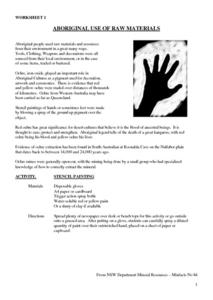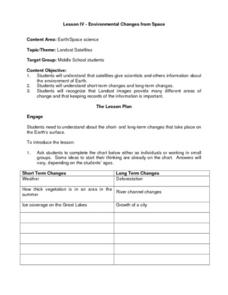University of Wisconsin
Follow the Drop
Young surveyors look for patterns in water flow around campus. Using a map of the school (that you will need to create), they mark the direction of the path of water. They also perform calculations for the volume that becomes runoff. The...
MENSA Education & Research Foundation
Ecosystems
Explore the Earth's different ecosystems through four lessons, an assessment, and extension activities. Lessons include informative text and step-by-step instructions to apply knowledge in interactive, and thought provoking ways; such as...
Workforce Solutions
A Colony for Lunar Living
Two lessons explore the possibility of living on the moon. First, scholars read various scenarios to identify which careers would best transfer to life in space. Finally, pupils examine a website to locate items made for outer space,...
ARKive
Species Discovery
How do you classify a newly discovered species? Learners view a presentation and complete research about biodiversity and the classification hierarchy. The lesson plan includes activities with dichotomous keys and work on classifying...
NOAA
A Day in the Life of an Ocean Explorer
What's life like aboard an ocean exploration vessel? Junior oceanographers examine the important role of communication in ocean research in lesson two of a five-part series from NOAA. The materials introduce the class to life on...
NSW Department Mineral Resources
Aboriginal Use of Raw Materials
What's the difference between base metals and precious metals? Experimenting with natural metals is an interesting way for kids to learn about the world around them. Use a resource that contains over 30 pages of worksheets and...
University of Texas
Matter and the Periodic Table Chemical Families and Periodic Trends
Is assembling the periodic table as simple as Tetris? Scholars arrange colored cards into a logical order and then make connections to the arrangement of the periodic table. Hands-on activities include adding trend arrows and analyzing...
Chicago Botanic Garden
Causes and Effects of Climate Change
Wrap-up a unit on global climate change with a lesson that examines the causes and effects of climate change. Learners fill out a chart that represents what they think causes climate change—natural and human-based—and what they think...
Purdue University
Design of a Canal for a New Water Park in Lafayette
Erosion is no match for our canals. Learners first perform experiments to test the amount of erosion for different materials and different slopes. Based on the results, they design ditches or canals that carry water from one location to...
Teach Engineering
Skin and the Effects of Ultraviolet Radiation
Though UV radiation can damage skin, it isn't all bad. The third installment in a six-part series allows the class to study the structure and function of skin. They learn about the different types of skin cancer and the SPF rating...
Cornell University
Bacteria Take Over and Down
Bacteria outnumber all other forms of life on Earth. Scholars observe the growth of bacteria in petri dishes to understand their role in maintaining good health. Then, they observe the growth of bacteria after they introduce...
University of Wisconsin
Infiltration Test: Exploring the Flow of Water Through Soils
Soil scientists gain experience with an infiltrometer can to determine the infiltration rates at different locations on campus. If you are using the entire unit, the class has already analyzed water flow and soil types, so they should...
Wilderness Classroom
Pollution
Educate scholars on pollution—air, water, and land—with a series of lessons that begin with a thorough explanation of each type. Learners then take part in three activities to reinforce the importance of reducing pollution. They...
Polar Bears International
Top of the World
Learn about polar bears and the Arctic circle with a lesson about the countries and conditions of the region. After examining how the area differs from Antarctica, kids explore climates, animals, and geographical position...
Curated OER
Environmental Changes from Space
Students discuss Landsat Satellites and the use of the images they provide as well as the purpose of keeping records of the information from the satellites. The class works in groups to complete a worksheet on short term and long term...
Curated OER
Power On to Present- What You Know About Where You Went
Third graders write an essay. In this earth's layers lesson plan, 3rd graders view a power point presentation on layers of the earth and discuss it. They write a short essay on the layers and their characteristics. They use Microsoft...
Curated OER
The Origin of Life
In this origin of life worksheet, young scholars write answers to five questions. They describe characteristics of the first life forms and how scientists believe oxygen accumulated in the Earth's atmosphere.
Curated OER
Green Buildings Virtual Tour
Students fill out a worksheet after researching green buildings by taking a virtual tour. In this green buildings lesson plan, students use Google Earth to research green buildings.
Curated OER
Bible (Day 7) Redemption and Caretakers
Whether you are religious or not, humans can be caretakers of the Earth. Students will discuss recycling, how their wasteful actions effect the Earth, and the Alaskan oil spill. They then have small group discussion and write about how...
Curated OER
Outgassing
Young scholars demonstrate the concept of outgassing and to explain the origins of the earth's atmosphere. They perform a simple experiment using glass jars, two antacid tablets, and some water. This experiment does a good job in...
Curated OER
The Magnetometer
Physical or earth science pupils prepare a magnetometer by inducing magnetism into a pair of straight pins. As the pins hang from a thread, they can be used to detect the magnetic field or poles of a magnet. They could also be used as a...
Carnegie Mellon University
Marcellus Shale: Who Pays?
After viewing short clips of unfortunate events, your class will consider two sides of a homeowner's court case, and then learn about the Marcellus shale deposit beneath the state of Pennsylvania and the hydraulic fracturing process. In...
Curated OER
Watering Our Prairie Farms
After reading an article about irrigation on Canadian farms, learners participate in a discussion. They individually write an opinion paper about the surrounding issues. A lesson like this can be used in an earth science class when...
Curated OER
Understanding Topographic Maps
Underclassmen create a cone-shaped landform and then draw a contour map for it. Then they examine a quadrangle (which was easily located with an online search), and relate it to what they experienced. The accompanying worksheet is...
Other popular searches
- Earth Science Lesson Plans
- Earth Science Lesson Nevada
- Science Earth Day Lessons
- 5e Lesson Plans Earth Science
- 5e Earth Science Lessons
- Earth Day Science Lesson Plans
- Earth Science Lessons Moon
- Free Earth Science Lessons

























